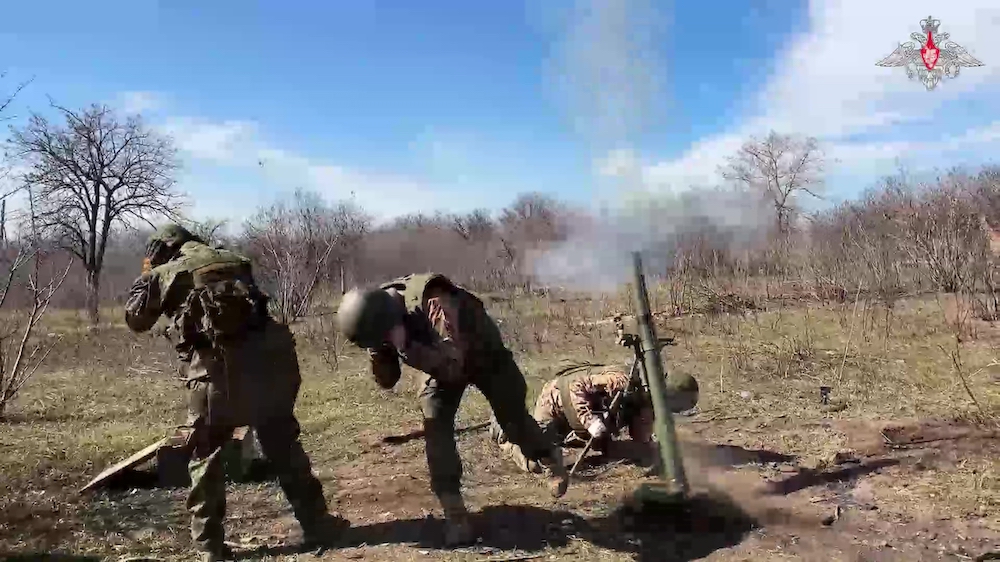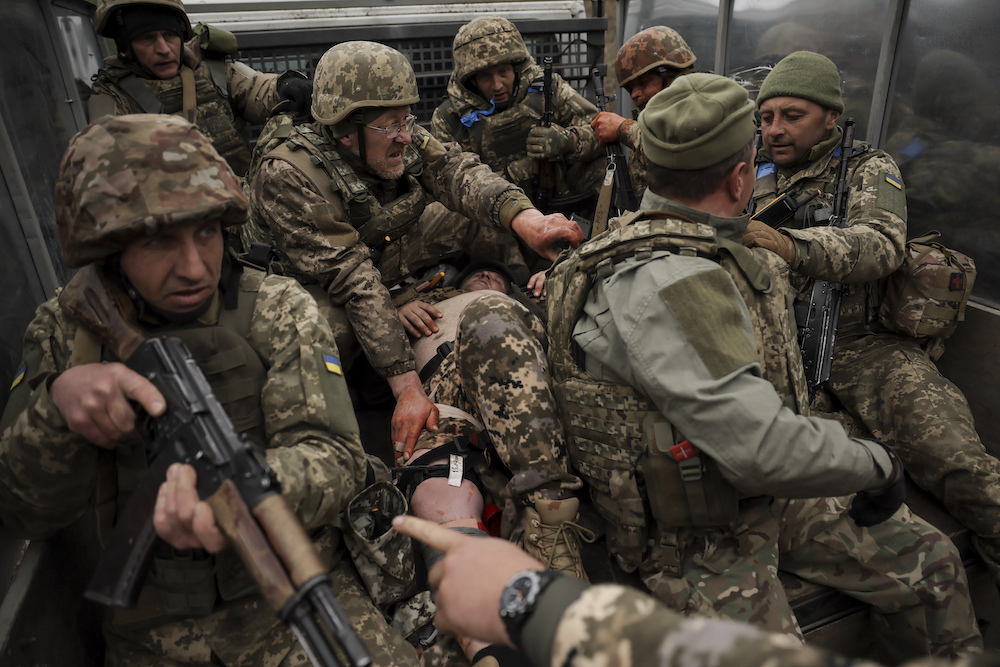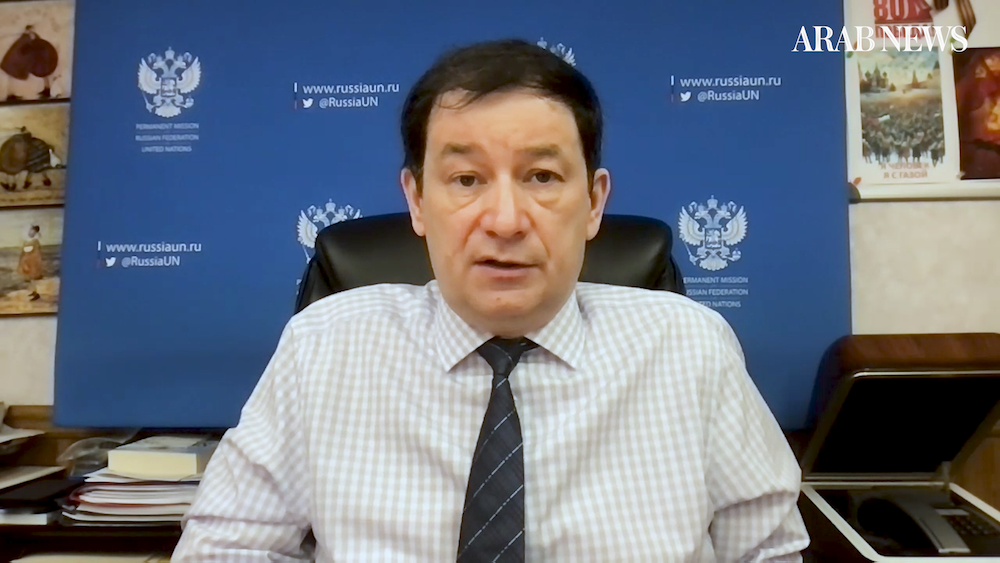RIYADH: Far from building bridges to end the war in Ukraine, the administration of former US President Joe Biden was part of the problem, Dmitry Polyanskiy, the first deputy permanent representative of the Russian Federation to the UN, has said.
In an interview with the Arab News current affairs program “Frankly Speaking,” Polyanskiy shared his insights on the complexities of the Ukraine conflict, the emerging role of Saudi Arabia in international diplomacy, and Russia’s perspectives on the crises in Gaza, Sudan, and Syria.
Appearing on “Frankly Speaking” just days after Saudi Arabia hosted separate talks between US officials and their counterparts from Russia and Ukraine, Polyanskiy suggested that a change of “optics” could have resolved the conflict years ago.
“The previous (American) administration was unfortunately part of the problem, not part of the solution,” Polyanskiy told “Frankly Speaking” host Katie Jensen. “And it has done a lot to create this issue, to set up something that is better characterized as anti-Russia rather than (pro-Ukraine).”
He argued that this “fatal decision to provoke Russia” had devastating consequences for Ukraine, leading to an escalation that ultimately triggered Moscow’s “special military operation” in February 2022.
According to Polyanskiy, Washington’s actions directly contributed to the conflict. “The Biden administration was one of those who was fueling the war, who was trying to do everything to inflict a strategic (defeat) on Russia, and it hasn’t changed its course until the very end,” he said.
In stark contrast, Polyanskiy praised the approach of US President Donald Trump, who returned to office in January, suggesting his administration had adopted a more realistic perspective aligned with the realities on the ground.

Dmitry Polyanskiy, the first deputy permanent representative of the Russian Federation to the UN, spoke on a wide range of geopolitical issues. (AN Photo)
“The Trump administration views it absolutely differently, and this is the right approach,” he said.
“They are realists. They understand the real situation on the battlefield. They understand that the Kyiv regime is now losing, and hence the new proposals that they are making, these are realistic proposals and really aimed at stopping hostilities, which would be a good scenario first and foremost for Ukraine.”
He encapsulated this shift in approach with a concise observation: “President Trump has just changed the optics.”
Last week’s talks in Riyadh saw a draft agreement involving a ceasefire over the Black Sea in exchange for an easing of sanctions on Russia. A byproduct of these talks has been Saudi Arabia’s emergence as a hub for international diplomacy.
Polyanskiy acknowledged and welcomed this development, highlighting the changing landscape of global diplomacy.
“The world is changing and new centers of diplomatic activity are emerging,” he said. “We used to have Geneva, for example, but Geneva is now very much compromised because of the position that the Swiss government has taken.
“They exploit a notion of neutrality, but they’re acting not as a neutral country.”
Polyansky expressed gratitude for Saudi Arabia’s proactive engagement in seeking a peaceful resolution.
“Against this background, our Saudi brothers behaved in a very, very positive way, in a very forthcoming manner,” he said. “They reached out to us, they reached out to Americans, to Ukrainians, and it’s hard to overestimate the role that they played.”
He also conveyed the appreciation of Russia’s leaders for Saudi Arabia’s efforts in facilitating these crucial discussions.
“We thank them very much for their hospitality,” he said. “The talks were organized at an excellent level, and I think that my leaders also reached out to their Saudi counterparts thanking them for what they are doing.”
Polyanskiy envisioned a promising future for Riyadh as a center for international diplomacy, particularly in the context of the Russia-Ukraine conflict.
“Riyadh right now has all the chances to transform into a diplomatic capital of the world, at least in terms of Russia-Ukraine, and the US-Russia-Ukraine negotiations,” he said.
“And it’s a very good start, and I think that there are all the chances that Saudi diplomacy will play a more instrumental role here, and we are very grateful for this opening.”
Expanding on the scope of the US-Russia talks, Polyanskiy noted that they encompassed broader issues beyond Ukraine, including the crisis in Gaza. He referenced Russian President Vladimir Putin’s previous statements affirming Russia’s support for the rights of the Palestinians.
When Arab News Editor-in-Chief Faisal Abbas interviewed Putin last year ahead of the BRICS summit in Kazan, the Russian president clearly stated Moscow’s support for a two-state solution and affirmed that the Palestinian people should not leave their land.
Responding to a question about Russia’s potential role in pressuring Israel to end the conflict in Gaza, Polyanskiy acknowledged the limitations of Moscow’s influence compared to that of Washington.
“It’s hard for us to put pressure on Israel, because I don’t think that we have the same leverage on Israeli politicians in comparison, for example, to the US, traditionally,” he said. “So of course the US role here is indispensable to put Israel on a more reasonable path.”
Polyanskiy expressed concern over the lack of progress in achieving a resolution and emphasized the importance of unified action by Arab countries.

In this photo taken from video distributed by Russian Defense Ministry Press Service on Sunday, March 30, 2025, a Russian mortar's crew fire during their military exercising at an undisclosed location. (Russian Defense Ministry Press Service via AP)
“I think that very much will depend on the mobilization of Arab countries themselves,” he said. “We know that there was recently an Arab summit in Cairo. There were very good decisions about the future of Gaza, about the possible ways of settlement.”
He reiterated Russia’s consistent stance on the necessity of a two-state solution as the foundation for any meaningful efforts toward resolving the Israeli-Palestinian conflict.
“Of course they are based on the two-state solution. This is the core principle that is indispensable for any efforts that are being deployed in this connection, including my country. My country has always been consistent in this, saying that the Palestinian problem should not be sidelined.”
Polyanskiy criticized past attempts to normalize relations between Arab countries and Israel at the expense of addressing the Palestinian issue.
He expressed uncertainty regarding the new US administration’s approach to the Middle East, while emphasizing the significance of Arab countries’ collective efforts.
“It’s very hard to forecast how the new US administration will frame its line right now in the Middle East,” he said. “But I see that there is still quite a considerable mobilization of Arab countries that are saying the right things about the ways to break this vicious cycle of violence.”
Polyanskiy voiced optimism that these demands would be heeded and that the Palestinian issue would receive the attention it deserves in future interactions concerning Middle Eastern problems.
“And I think that the louder they speak, the more chances there are to see that these very rightful and fair demands are heeded and the Palestinian issue is not being, will not be swept under the carpet in any possible interactions on the Middle Eastern problems.”
Reflecting on past mediation efforts, Polyanskiy highlighted the effectiveness of the moribund Middle East Quartet, consisting of the UN, US, EU, and Russia.
“The Quartet of international mediators was the best format that was capable of moving forward and finding the solution, a fair solution to the Palestinian problem in line with the decisions taken by the UN and by the UN Security Council in particular,” said Polyanskiy.
He expressed disappointment with the US approach to facilitating negotiations between Arab countries and Israel, which he believed had sidelined the Palestinian problem.
“We were not happy, to put it mildly, by the efforts of the US to facilitate negotiations and peace between Arab countries at the expense of the Palestinian problem,” he said.
He further elaborated on the perceived shift in priorities, suggesting that the sequence of addressing the Palestinian problem had been twisted, leading to the current challenges.
“We are not aware of the details of the arrangement. But in reality, it happened so that the Palestinian problem was a little bit sidelined and the US administration was speaking about the possibility of making bilateral arrangements between Arab countries and Israel and then to solve the Palestinian problem.”
Polyanskiy attributed the current state of affairs to this change in attitude and the abandonment of previously agreed-upon policies.
“This was international cooperation, international mediation in the framework of the Quartet. So, all of a sudden it was undermined and I think that now we are feeling the fallout from these decisions.”

Ukraine's 24th Mechanized Brigade at an undisclosed location in the east of Ukraine, Saturday, March 29, 2025. (Oleg Petrasiuk/Ukraine's 24th Mechanized Brigade via AP)
Turning to the crisis in Sudan, Polyanskiy discussed Russia’s perspective on the conflict and its support for the Sudanese authorities.
Since April 2023, the war in Sudan has seen mass displacement, humanitarian suffering, and the destabilization of the wider region.
In a major turning point last week, the Sudanese Armed Forces, led by Sudan’s de-facto leader, General Abdel Fattah Al-Burhan, retook the capital city, Khartoum, forcing the paramilitary Rapid Support Forces to retreat to their strongholds in Darfur and the south.
Polyanskiy said Russia welcomed the development. “We support the Sudanese authorities,” he said. “We think that they are right in continuing their fight against the RSF. So we are quite clear and we don’t think that the international community should put at the same level the RSF and the government of Sudan.”
Polyanskiy expressed optimism about the situation. “We are aware of the gains that were made on the battlefield and we think that the situation in Sudan is moving towards the right direction militarily. And we hope that this will also be a good opportunity to ensure stable and long-lasting peace in this country.”
Despite the widespread suffering in Sudan, Russia was recently the only nation to veto a UN Security Council resolution calling for a ceasefire and declined to call the situation there a famine.
Addressing the resulting criticism, Polyanskiy said: “This is not a very correct interpretation, with all due respect.
“First of all, we vetoed this resolution not because there was a call for a ceasefire, but because there were, first of all, attempts to put at the same level the RSF and the government.”
Polyanskiy explained that Russia’s concerns stemmed from attempts to equate the RSF with the government and the inclusion of language that could be interpreted as encouraging the RSF to engage in military actions against the government.
He suggested that the resolution’s pen holders, Britain, could have made the text more balanced and focused on humanitarian issues, including a ceasefire, which Russia would have been ready to support.

Appearing on “Frankly Speaking” just days after Saudi Arabia hosted separate talks between US officials and their counterparts from Russia and Ukraine, Polyanskiy suggested that a change of “optics” could have resolved the Russia-Ukraine conflict years ago. (AN Photo)
“But it happened so that they were insistent on this, and we had to veto this text,” he said, also highlighting Russia’s opposition to foreign interference in Sudan’s internal affairs.
“We couldn’t let it go and we couldn’t really see the situation when there is such foreign interference into the foreign affairs, or into the internal affairs of Sudan.”
He added: “As far as famine is concerned, the problem is that some countries, some Western countries are really trying to use this factor of famine as something to undermine the position and the efforts of the central government, which is not the right way to do it, because there is enough food in Sudan.”
Polyanskiy attributed the distribution challenges and the availability of food to those in need as the primary issues, rather than a lack of food in the country.
“Hunger shouldn’t be instrumentalized and used as a tool in any propaganda campaign against any country, including Sudan,” he said.
Addressing the upheaval in Syria since December last year, Polyanskiy discussed Russia’s response to the ousting of Bashar Assad’s regime and the future of Moscow’s relations with Damascus.
Russia suffered a major setback in December when the Assad regime, which Moscow had supported since 2015, was suddenly swept from power by opposition groups, forcing Assad and his family to seek asylum in Moscow.
Asked whether Moscow would consider handing over Assad to Syria’s transitional government, headed by President Ahmed Al-Sharaa, if requested, Polyanskiy said he would not be drawn on hypotheticals.
Instead, Polyanskiy emphasized Russia’s desire for a peaceful transition in Syria, with inclusive authorities representing all Syrians and committed to combating terrorism.
“We wanted to turn over this page of conflicts and problems that lasted for so long,” he said. “We want to see inclusive Syrian authorities that represent all Syrians that take on board the position of all Syrians.
“We think that Syria should make serious efforts in combating terrorism to avoid the situation when terrorist elements in this country play a significant role.”
Polyanskiy reiterated Russia’s commitment to “maintaining close ties of friendship, traditional ties of friendship, between Russian and Syrian people that lasted for many decades.”
When pressed on the possible fate of Assad should the new government seek to prosecute him for crimes committed during the civil war, Polyanskiy maintained that the transitional authority had more pressing concerns.
“Let’s not discuss hypothetical things,” he said. “We provided him with asylum for humanitarian reasons. And I think that there are channels to discuss these issues. So far I haven’t seen such a request. And I don’t think that this is the main problem that should be the concern of Syrian authorities right now.”
Asked whether he thought the Syrian people would welcome any aid or assistance offered by Moscow, Polyanskiy said the two nations shared a long history of friendship, and that Russia would like to help Syrian during this transitional period.
“We still have and we will have, I’m absolutely sure, very good and constructive relations with Syrians because it’s not the question of developments of recent months or weeks. It’s the question of long-term ties of friendship and brotherhood that links us to Syria. And I think that the very vast majority of Syrians view Russia as a friendly country and the same in Russia.
“We have very good basic elements to consolidate friendship and cooperation between our countries. And we are very eager to help Syrians during this transitional period to shape up this country in a way that they like and in a way that guarantees sustainable development of this country for years ahead.”
























